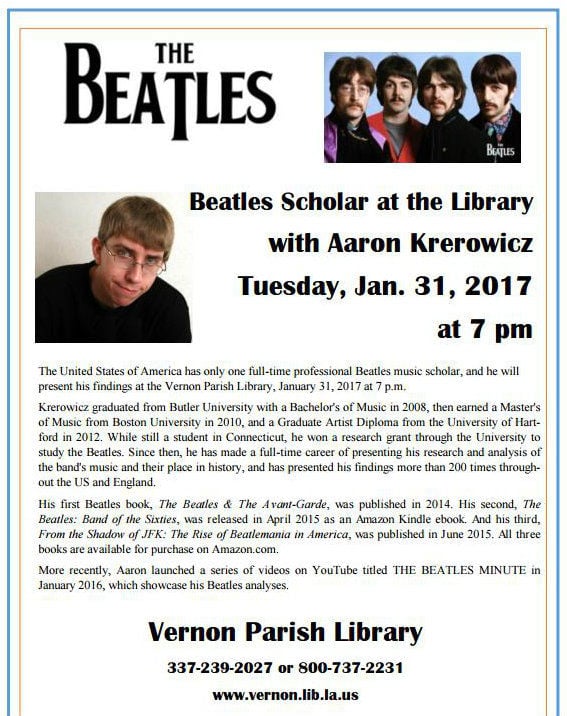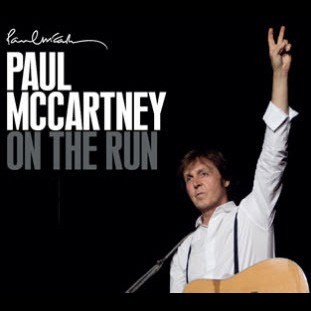
www.donaldsonvillechief.com
More Than a Pop Group: Beatles lecturer speaks in Vernon Parish
Posted Feb 9, 2017
DonaldsonvilleChief
Posted Feb 9, 2017
The Beatles were much more than just a pop group.

Aaron Krerowicz, a 30-year professional Beatles scholar, spoke recently about the British group at the Vernon Parish Library.
The Beatles were much more than just a pop group.
"They are a major landmark in music history."
So said Aaron Krerowics, a 30-year-old professional Beatles scholar, when he spoke Jan. 31 at the Vernon Parish Public Library.
His lecture, "The Beatles — The Band of the 60s," discussed the growth of the band as a whole, changes within the individual members, and their musical and political influences within the context of the decade. Krerowics said emergence of the Beatles, and their eventual break up, fits cleanly within the decade. Their first concert at the famed Cavern Club was Feb. 9, 1961, and the day when Paul McCartney announced the band was breaking up was April 10, 1970.
"The 60s began in black-and-white, and ended in color," he said.
This applies to many aspects of the decade — literally the move from black-and-white to color television — or more symbolically. The decade started with Dwight D. Eisenhower, the last U.S. president born in the 19th century, and moved on to Camelot, the Vietnam War, the war protests, the culturally colorful hippy rebellion and Woodstock.
The Beatles, too, moved from black and white to color. Their first album released in the United States, "Meet the Beatles," had a stark, high-contrast black and white cover, and their first movie, "A Hard Day's Night," was also black and white.
Only three years later, the colorful and elaborate album cover for "Sgt. Pepper's Lonely Hearts Club Band," helped usher in the psychedelic era, followed by the animated film "Yellow Submarine," with its bright Peter Max-influenced visuals, and its soundtrack. The film is credited with bringing more interest in animation as a serious art form.

Krerowics' backround
Krerowics' fascination with the Beatles began when he was growing up in the 90s, he said. His dad would play Beatles music for him.
In 2009, the remastered CDs were released, and he listened to their music again, but this time with musically educated and experienced ears. That gave him a new appreciation for the band and their achievements, he said.
Krerowics' favorite song by the Beatles is "I Am the Walrus."
"It's pure Lennon fantasy," he said.
He vividly remembers the moment when he realized the profundity of the Beatles' music. He was living in Revere, Massachusetts in 2010, commuting to Boston University on the blue line subway, listening to "I Am The Walrus." It was at that moment when he realized the impact of the Beatles.
Krerowics won a research grant through the University of Hartford in 2011 to study the band. Since then he has presented his findings in over 300 presentations throughout the United States and England.
Among Beatles experts, most authors focus on the band's history. But the musical analysis of Beatles' songs remains largely unexplored, Krerowics said.
"While history is both fascinating and important, the Beatles were first and foremost musicians," he said."Since my background and academic education is extensive, I have the analytical techniques and a thorough understanding of music theory to conduct exhaustive and rigorous analysis of this music," he said.
He has developed this presentation in order to explain this extremely sophisticated musical analysis in ways that an audience doesn't need a bachelor's degree in music theory to understand.

Their impact
Krerowics explained that during the Beatle's residencies in Hamburg, Germany, from 1960 through 1962, they learned a lot about stage presence.
"They couldn't play timidly if they wanted loud drunk German crowds to actually listen to their music," he said.
They wrote their own songs, which was rare for that era. Even so, they rarely strayed from sweet love songs with a rock-and-roll beat. That changed — dramatically — due to the influence of Bob Dylan.
At the start of his music career, John Lennon wrote songs mostly about puppy love. He gradually moved into writing about the pain of broken relationships. It was not until Lennon met, and was influenced by, Dylan that his lyrics became an expression of his emotions, vulnerability, and insecurity. His music became a vehicle for personal expression, Krerowics said.
Dylan influenced Paul McCartney, not in lyrics, but in songwriting. McCartney's work started off jazzy and poppy. McCartney's growth, as affected by Dylan's style, first became evident in "I'll Follow the Sun," which was more mature-sounding; slower, softer, mellower, he said.
By 1966, the Beatles had to cease touring and move strictly to studio recording. Beatlemania was out of hand, and the Beatles could not hear themselves playing during concerts. As Ringo Star put it, "People came to see, not hear us."
This inhibited their growth and development as a band. The studio afforded them time and space for experimentation.
In 1968, following the death of their manager, Brian Epstein, the Beatles flew to India to study meditation. This was a creatively fertile time for them and led to the diverse musical styles on "The Beatles," more commonly known as "The White Album."
Ironically, John Lennon said "The White Album" was the beginning of the end, because every track was an individual track. It was "John and the band, Paul and the band, George and the band," Krerowics said.
It was also at this time that Yoko Ono became increasingly important in Lennon's thoughts and life — so much so that she was a distraction for the other three Beatles. So much has been speculated about how much she contributed to the demise of the band. Krerowics shared his opinion.
"I think the Beatles were already coming to an end, and she just accelerated what was already going to happen," he said.
Another irony surrounds the Beatles' album, "Abbey Road," which was not the last Beatles album released but consisted of the last tracks the Beatles recorded together.
These showed the Beatles as stronger than ever, and Krerowics believes this represents George Harrison's pinnacle as a songwriter during his time with the Beatles.
As Harrison became more sophisticated, he became more prevalent, and Krerowics pointed to the song "Something" as a standout.
Very few events fit so nicely into a single decade the way the Beatles fit into the 60s.
Paul McCartney believes the Beatles weren't the leaders of their generation but the spokesmen for their generation. Krerowics thinks the Beatles truly were the leaders.
Audience reaction
Audience members enjoyed the lecture.
Isabella Cortez, fourth grade West Leesville Elemetary, was excited when she heard a Beatles scholar was coming to the library. With her social studies project on the Beatles, she has recently won school, parish, and regional competitions, and is moving on to the state level.
"I learned a lot from his lecture," she said.
She added that she particularly liked the movie "Yellow Submarine."
"Animation wasn't that big until the Beatles got into it," she said.
Alan King Betterton said he enjoyed Krerowics' presentation.
"He gave the program from a different perspective. I read a lot about the Beatles, so I knew a lot of the facts, but I never really thought about some of the things he brought up, like his analysis of the music," Betterton said.

No hay comentarios:
Publicar un comentario